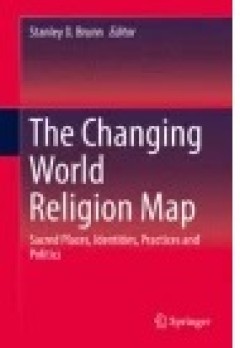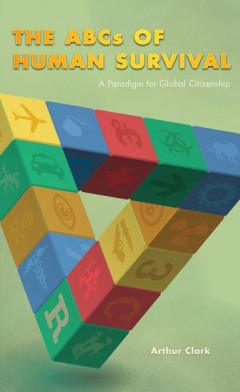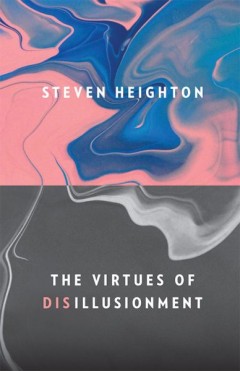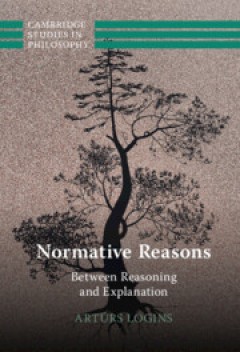Filter by

How to Read Like You Mean It
Building on the work of hermeneutics scholar Paul Ricoeur, Conway evaluates the recurring paradox of miscommunication that results in deeper understanding and proposes strategies for reading that will allow individuals give up the illusion of certainty. In elegant and compelling prose, Conway introduces readers to the idea that it is through uncertainty that we can gain access to new and meanin…
- Edition
- -
- ISBN/ISSN
- -
- Collation
- -
- Series Title
- Cultural Dialectics
- Call Number
- 6 x 9, 168 pages

The Changing World Religion Map
Beginning with an introduction of the concept of the “changing world religion map”, the book first focuses on nature, ethics and the environment. It examines humankind’s eternal search for the sacred, and discusses the emergence of “green” religion as a theme that cuts across many faiths. Next, the book turns to the theme of the pilgrimage, illustrated by many examples from all parts …
- Edition
- -
- ISBN/ISSN
- 978-94-017-9376-6
- Collation
- XLVII, 3926
- Series Title
- -
- Call Number
- -

Liability for Crimes Involving Artificial Intelligence Systems
The book develops a general legal theory concerning the liability for offenses involving artificial intelligence systems. The involvement of the artificial intelligence systems in these offenses may be as perpetrators, accomplices or mere instruments. The general legal theory proposed in this book is based on the current criminal law in most modern legal systems. In most modern countries, unma…
- Edition
- -
- ISBN/ISSN
- 978-3-319-10124-8
- Collation
- -
- Series Title
- -
- Call Number
- -

ABCs of Human Survival A Paradigm for Global Citizenship
The ABCs of Human Survival examines the effect of militant nationalism and the lawlessness of powerful states on the well-being of individuals and local communities―and the essential role of global citizenship within that dynamic. Based on the analysis of world events, Dr. Arthur Clark presents militant nationalism as a pathological pattern of thinking that threatens our security, while empha…
- Edition
- -
- ISBN/ISSN
- 9781897425688.01
- Collation
- -
- Series Title
- Global Peace Studies
- Call Number
- 280 pages

Leibniz’s Metaphysics and Adoption of Substantial Forms: Between Continuity…
This anthology is about the signal change in Leibniz’s metaphysics with his explicit adoption of substantial forms in 1678-79. This change can either be seen as a moment of discontinuity with his metaphysics of maturity or as a moment of continuity, such as a passage to the metaphysics from his last years. Between the end of his sejour at Paris (November 1676) and the first part of the Ha…
- Edition
- -
- ISBN/ISSN
- 978-94-017-9956-0
- Collation
- -
- Series Title
- -
- Call Number
- -

Leibniz on the Parallel Postulate and the Foundations of Geometry: The Unpubl…
This book offers a general introduction to the geometrical studies of Gottfried Wilhelm Leibniz (1646-1716) and his mathematical epistemology. In particular, it focuses on his theory of parallel lines and his attempts to prove the famous Parallel Postulate. Furthermore it explains the role that Leibniz’s work played in the development of non-Euclidean geometry. The first part is an overview o…
- Edition
- -
- ISBN/ISSN
- 978-3-319-19863-7
- Collation
- -
- Series Title
- -
- Call Number
- -

The Virtues of Disillusionment
Most people go through life chasing illusions of success, fame, wealth, happiness, and few things are more painful than the reality-revealing loss of an illusion. But if illusions are negative, why is the opposite, being disillusioned, also negative? In this essay based on his inaugural writer-in-residence lecture at Athabasca University, internationally acclaimed writer Steven Heighton mathema…
- Edition
- -
- ISBN/ISSN
- 9781771993265.01
- Collation
- -
- Series Title
- -
- Call Number
- 5 x 8, 48 pages

Explanation in Biology
Patterns of explanation in biology have long been recognized as different from those deployed in other scientific disciplines, especially that of physics. Celebrating the diversity of interpretative models found in biology, this volume details their varying types as well as explaining their relationships to one another. It covers the key differentials with other sciences in the nature of explan…
- Edition
- -
- ISBN/ISSN
- 978-94-017-9822-8
- Collation
- 52 b/w illustrations
- Series Title
- -
- Call Number
- -

Explaining Photosynthesis
Recounting the compelling story of a scientific discovery that took more than a century to complete, this trail-blazing monograph focuses on methodological issues and is the first to delve into this subject. This book charts how the biochemical and biophysical mechanisms of photosynthesis were teased out by succeeding generations of scientists, and the author highlights the reconstruction of th…
- Edition
- -
- ISBN/ISSN
- 978-94-017-9582-1
- Collation
- 56 b/w illustrations, 6 illustrations in colour
- Series Title
- -
- Call Number
- -

Normative Reasons: Between Reasoning and Explanation
Reasons matter greatly to us in both ordinary and theoretical contexts, being connected to two fundamental normative concerns: figuring out what we should do and what attitudes to have, and understanding the duties and responsibilities that apply to us.
- Edition
- -
- ISBN/ISSN
- 9781009076012
- Collation
- -
- Series Title
- -
- Call Number
- T 160 LOG n
 Computer Science, Information & General Works
Computer Science, Information & General Works  Philosophy & Psychology
Philosophy & Psychology  Religion
Religion  Social Sciences
Social Sciences  Language
Language  Pure Science
Pure Science  Applied Sciences
Applied Sciences  Art & Recreation
Art & Recreation  Literature
Literature  History & Geography
History & Geography